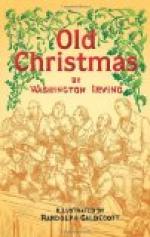I was let briefly into his history by Frank Bracebridge. He was an old bachelor of a small independent income, which by careful management was sufficient for all his wants. He revolved through the family system like a vagrant comet in its orbit; sometimes visiting one branch, and sometimes another quite remote; as is often the case with gentlemen of extensive connections and small fortunes in England. He had a chirping, buoyant disposition, always enjoying the present moment; and his frequent change of scene and company prevented his acquiring those rusty unaccommodating habits with which old bachelors are so uncharitably charged. He was a complete family chronicle, being versed in the genealogy, history, and intermarriages of the whole house of Bracebridge, which made him a great favourite with the old folks; he was a beau of all the elder ladies and superannuated spinsters, among whom he was habitually considered rather a young fellow, and he was a master of the revels among the children; so that there was not a more popular being in the sphere in which he moved than Mr. Simon Bracebridge. Of late years he had resided almost entirely with the Squire, to whom he had become a factotum, and whom he particularly delighted by jumping with his humour in respect to old times, and by having a scrap of an old song to suit every occasion. We had presently a specimen of his last mentioned talent; for no sooner was supper removed, and spiced wines and other beverages peculiar to the season introduced, than Master Simon was called on for a good old Christmas song. He bethought himself for a moment, and then, with a sparkle of the eye, and a voice that was by no means bad, excepting that it ran occasionally into a falsetto, like the notes of a split reed, he quavered forth a quaint old ditty:
“Now Christmas
is come,
Let us beat up the drum,
And call all our neighbours together;
And when they appear,
Let us make them such cheer
As will keep out the wind and the weather,”
etc.
The supper had disposed every one to gaiety, and an old harper was summoned from the servants’ hall, where he had been strumming all the evening, and to all appearance comforting himself with some of the Squire’s home-brewed. He was a kind of hanger-on, I was told, of the establishment, and though ostensibly a resident of the village, was oftener to be found in the Squire’s kitchen than his own home, the old gentleman being fond of the sound of “harp in hall.”




